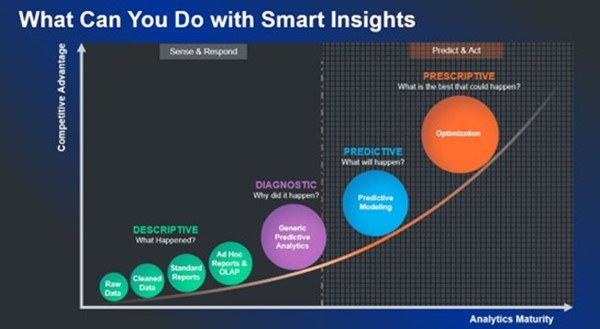Data Management & Insights: How AI is Disrupting Business in a Good Way
August 22, 2023
At a glance
- Main takeaway: Before you dive into an AI solution, your focus should be, as always, on understanding what problem you are trying to solve and ensuring you have all the right data pieces together.
- Impact on your business: If your company lacks a good data management process, AI capabilities with ungoverned, unmanaged and poor-quality data can negatively impact your company.
- Next steps: Aprio’s Data Management & Insights Services team can help you understand and identify the problems you are trying to solve, provide you with data-based recommendations to give you confidence to make informed business decisions and help you apply AI in a way to harness efficiencies and increase productivity.
Are you ready to learn more? Schedule a conversation with our team.
The full story:
Artificial intelligence (AI) is not a new concept. In fact, it’s been around for years, however, it has become more accessible to everyone courtesy for ChatGPT and other tools. Every business is now determined to find reasons as to why they should integrate AI capabilities into their day-to-day business operations, because if they do not, they will be left behind.
Classification types of AI
AI refers to the simulation of human intelligence processes by machines, especially computer systems. These processes include learning, reasoning, problem-solving, perception and language understanding. AI is typically classified into two types:
- Narrow AI: These are systems that are designed to carry out a narrow task, like voice recognition or driving a car. They operate under a limited set of constraints and are focused on performing a single task. They lack understanding or consciousness and function based on a set of programmed rules or algorithms. Most of the AI that we encounter in our daily lives falls under this category, such as recommendation systems like those of Netflix or Amazon.
- General AI: These are systems that possess the ability to understand, learn, adapt and implement knowledge across a broad range of tasks at a level equal to or beyond a human. This type of AI is more complex and involves machine consciousness or the ability to understand concepts in a way similar to human beings. General This AI type is what has been introduced more recently, been introduced that is and has the potential to positively disrupting businesses.
AI techniques used across various industries
AI can be achieved by different techniques, including machine learning, where a system learns and improves from experience, and deep learning, which is a subset of machine learning that uses neural networks with many layers.
AI technology has evolved significantly and is now being used in a wide variety of fields to provide solutions to complex problems and enhance operational efficiency. Here are some use cases as of 2023:
- Healthcare: AI is used in predicting disease outbreaks, interpreting medical images, creating personalized treatment plans, and managing patient data and health records. It’s also used for drug discovery and development, helping to speed up introducing new medications to the market.
- Automotive: Autonomous vehicles use AI for navigation, obstacle avoidance
,and decision-making in real-time. AI is also used in predictive maintenance, manufacturing processes,and personalizing the in-car experience. - Finance: Within the finance sector, AI aids in fraud detection, algorithmic trading, managing investments, underwriting loans
,and personalizing customer service. Robo-advisors use AI to give financial advice and manage portfolios. - Retail: Retailers use AI for demand forecasting, inventory management
,and customer behavior analysis to personalize experiences. It also enables chatbot services for customer interactions and plays a key role in logistics and supply chain management. - Agriculture: AI helps in predictive analysis for crop diseases, weather prediction, precision farming
,and livestock monitoring. Drone technology integrated with AI helps farmers with crop monitoring and soil analysis. - Education: Within the education sector, AI provides personalized learning experiences, tutors, and grading systems. It also aids in administrative tasks like scheduling and student services.
- Entertainment: AI is used in content recommendation systems, game development, virtual reality, and creating digital art. It’s also been used to generate new scripts, songs
,and other creative content. - Climate Change and Environmental Monitoring: AI helps model climate change impacts, optimize energy usage, and monitor wildlife or track illegal logging and poaching activities. It’s also used in waste management and predicting natural disasters.
- Space Exploration: AI assists in data analysis from space probes and telescopes, autonomous systems for spacecraft
,and rover explorations. - Cybersecurity: AI aids in intrusion detection, threat analysis
,and response to cyber attacks. It also helps in predictive security breach analysis.
These are just some of the current use cases. The potential applications of AI are vast and continue to expand as the technology matures and becomes more integrated into our daily lives.
Understanding how AI is disrupting the way businesses think about data management
Most businesses are not really getting any benefit out of AI because they don’t understand it, they don’t have a concrete use case for it, they don’t have well managed data and they don’t know how to leverage AI to get the outcomes they desire. Instead of going back and forth over whether or not there is value in integrating AI capabilities into your business, your focus should be on understanding what problem you are trying to solve, ensuring you have all the pieces together and the right platform, which starts with data management.
While the scenarios you can run through with AI feel infinite, when it comes to data management, AI can help businesses understand and gain insights so they can predict behavior. At the basic business intelligence level, AI can make a significant difference with data mining and creating complex models to analyze the data and deliver insights to back recommendations.
If you peel back the layers of data management, each level of reporting provides you with different outcomes:
- Descriptive reporting tells you what happened in the past,
- Diagnostic reporting tells you why something happened,
- Predictive reporting tells you what will most likely happen in the future and
- Prescriptive reporting recommends actions you can take to change the outcome.

Prescriptive reporting is the sweet spot where AI comes to play and provides recommendations, so you can understand that if you want to change the path your business is on, you need to apply this model. The key behind the AI disruption in data management is the velocity in which you can gather data, analyze the data, take action and then validate your actions by running through the same process to prove your insights worked.
Let’s say your company is trying to understand why you’ve had an uptick in customers churning. Traditionally, your data engineer or data analyst would collect all relevant data on your customers, analyze it, apply the models and create reports that provide your company with insights and recommendations. This process would likely take weeks if not months to complete from start to finish if a human worked on it. With AI, you could ask it a simple question, such as — “why have we experienced an uptick in customers churning?” — and it will go through the same process that a human would, but you’d achieve the insights within minutes. Since AI is equipped with cognitive reasoning, it can continue to learn and when you run through the same question above, AI will provide you with new probabilities and patterns with current data thus building a confidence level that the recommendations and the outcome you wanted happened.
So, how can businesses overcome the challenges and leverage AI?
If your business has AI capabilities but you do not have a full understanding of your business and the problems you are trying to solve, all the data you are pumping out via AI will be overwhelming. Additionally, if you do not have a good data management process in place, AI with ungoverned, unmanaged and poor-quality data can be negatively impactful for your company.
There is a yin and yang when it comes to AI and it’s crucial to understand that the path to leveraging it is no easy feat. Before you dive headfirst into the world of AI, you first need to:
- Get a clean and distinct understanding of your business. Ask yourself, “What is your business outcome? What are the things you need to know to run your business?” Whether that be implementing price lifts or preventing customers from churning, you should not adopt AI capabilities until you have a firm grasp on your business.
- Have the right data management skills in place. Not every company can afford to hire a data scientist, however, to ensure the data that is being entered and collected is appropriately governed and accurate, you need to have a data engineer or data analyst on staff. Remember your insights are only as good as your data.
- Select the right platform to integrate with AI. Unfortunately, you can no longer use traditional business intelligence tools when integrating AI. When it comes to AI, you need to go beyond the traditional platforms.
- Take action once you have the insights. You have your insights, but you now need the ability to take action. By fully understanding the outcome and benefits, you can implement the insights and then repeat your steps to validate and see where you are at.
- Invest time with your staff so they understand the benefits of AI. Discuss how AI will save them time that they can then use for more strategic efforts of which they are being tasked. Getting their buy-in and understanding on how this will help them can ensure its adoption as a tool for the company.
The bottom line
Since we are just seeing the dawn of where AI is going, it makes it difficult to predict how it’s going to fully impact businesses. But make no mistake, the impact of AI is going to be massive, and it will disrupt every profession and industry at some level. So, instead of broaching the concept of integrating AI from the “everyone has it, so I must too” mindset, you need to shift your thinking and broach AI from “what is the business problem I am trying to solve and is AI the right way to help my business accomplish it?”
Not sure if AI is right for your business? Aprio’s Data Management & Insights Services team can help you understand and identify the problems you are trying to solve and provide you with data-based recommendations to give you confidence to make informative business decisions.
Related Resources/Assets/Aprio.com articles/pages
Filter Out the Noise with Data Science Driven Price Optimization
No Business is Immune to Cyberattacks: What SMBs Need to Know About Cybersecurity
Case Study: Secure Your Environment Across Endpoints, Cloud and Infrastructure
About Aprio’s Digital Advisory Services
About Aprio’s Data Management & Insights Services
Are you ready to learn more? Schedule a conversation with our team.
Recent Articles
About the Author
Greg Levins
As an experienced senior leader in the Digital Technology space, I help organizations leverage the exact innovative solutions they require to achieve their strategic business goals. I lead a team of highly skilled technology professionals to help businesses maximize their digital investments, successfully navigate the digital landscape, and stay competitive. No matter your company’s size or stage of the growth journey, we’ll help you identify and implement ideal solutions to move your business forward.
(470) 205-2859
Stay informed with Aprio.
Get industry news and leading insights delivered straight to your inbox.

